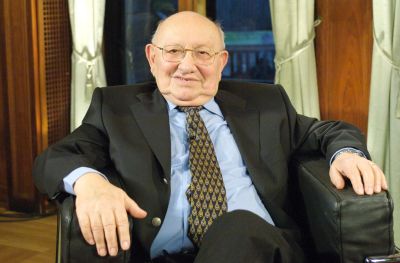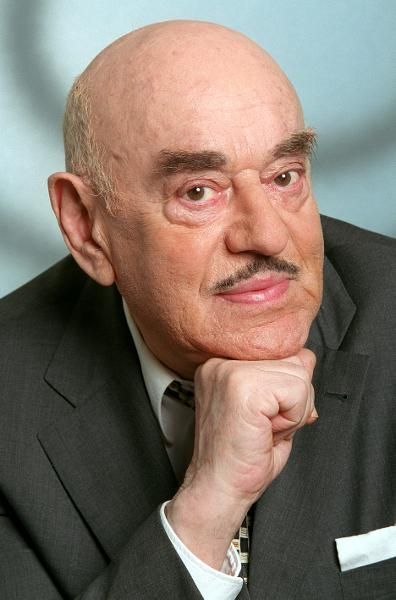Reich-Ranicki, Marcel

Marcel Reich-Ranicki was the first and hitherto the only literary critic to empty the streets in Germany. Many viewers arranged to see his TV programme together. And on the following day there were loud discussions amongst people imitating his inimitable Eastern European accent. He was the superstar of the “Literary Quartet” on ZDF, and the late 1980s marked the peak of his career as the most successful literary critic in Germany. The German press loved to call him the Literature Pope.
Behind him lay his work as literary critic for the “Frankfurter Allgemeinen Zeitung”. Later he was to become literary critic on the Hamburg weekly paper “Die Zeit” and finally head of the literary department on the FAZ. Behind him also lay his grammar school years in Berlin under Nazi Germany, his deportation to Warsaw during the so-called “Polish Action” in 1938, the inconceivable cruelties of the Warsaw ghetto, and the deaths of his relatives in the concentration camps, his flight and years in hiding, his work with the Polish secret police (UB), with the Polish foreign press service (MBP) and his work in the Polish Embassy in London. Behind him also was his return to Poland and another imprisonment, a ban on publication and finally his flight to the Federal Republic of Germany in 1958. From then on the Polish-German publicist and literary critic made his home in the FRG and was a prominent figure in popularising German literature. He never denied his Jewish, Polish-German origins, but nonetheless wrote in his autobiography that he had “no country of his own, no home and no fatherland”. In the final analysis he maintained his home was in literature. When we look back on his life we are more than inclined to believe him.
Historical and biographical dates
- 1920 Born in Włocławek (Poland). Both his parents were Jews. His father David Reich was Polish. His mother Helene Reich (maiden name Auerbach) was German.
- 1927 Attends German language school in Włocławek.
- 1929 Emigrates to his mother's family in Berlin
- 1930 School at the Werner von Siemens Gymnasium (Berlin, suburb of Schöneberg).
- 1934 Member of the Jewish Boy Scouts movement in Germany.
- 1935 Fichte Gymnasium (Berlin, Wilmersdorf).
- 1938 A-levels
- 1938 His application for university matriculation (German studies) is rejected
- 1938 Deportation from Berlin to Warsaw (“Poland Action”)
- 1940 Forced resettlement in the Warsaw ghetto. He works with the Council of Elders, the “Jewish Council”.
- 1942 Start of deportations of the ghetto inhabitants to the Treblinka extermination camp. Marries Teofila Langnas (members of the Jewish Council and married people were not at first deported)
- 1943 Flight from the ghetto
- 1944 Liberated from his hiding place by the Red Army
- 1944 Start of his work for the postal censorship office, sub-department of the Ministry of Public Security (MBP)
- 1945 Deputy head of Department III of the Head Office of Censorship in Warsaw
- 1945 Joins the Polish Communist Party PPR (“Polish Workers’ Party”).
- 1946 Works for the Polish military mission and the foreign news service in Berlin. From April, in Warsaw, work in Department II, Section IV of the MBP.
- 1948 under the name Ranicki, Vice Consul (later Consul) of the Republic of Poland in London and in the rank of colonel, head of the foreign news service
- 1949 Recalled to Warsaw from London. 14 days solitary confinement in prison.
- 1950 Sacked from the Foreign Service and Secret Service
- 1950 Expelled from the Communist Party
- 1950 Lector for German literature in the publishing department of the Ministry of Defence
- 1951 Publications in the Warsaw weekly “Nowa Kultura”.
- 1952 Freelance work and for the Warsaw monthly journal “Twórczość”. Translator
- 1953 Publication ban.
- 1954 Publication ban lifted.
- 1957 First study trips to Austria and the Federal Republic of Germany arranged by the Polish Writers’ League.
- 1958 Study trip to the Federal Republic of Germany. He does not return to Poland but lives in Frankfurt am Main.
- 1958 Initial participation in a meeting of “Gruppe 47”, a democratic amalgamation of writers and publicists
- 1958 Literary critic on the Frankfurter Allgemeinen Zeitung (FAZ)
- 1959 Moves house to the Hamburg suburb of Niendorf
- 1960 Literary critic on the Hamburg weekly “Die Zeit”
- 1971 to 1975 Guest professor in Stockholm and Uppsala
- 1973 to 1988 Head of the literature department on the FAZ
- 1974 Honorary professor at the Eberhard Karls University, Tübingen
- 1988 to 2001 Regular appearance on the programme “The Literary Quartet” on ZDF
- 1990 Heinrich Heine Guest Professor at the Heinrich Heine University, Düsseldorf
- 1991 Heinrich Hertz Guest Professor at the University of Karlsruhe
- 1999 Publishes his autobiography “Mein Leben”
- 2006 Made an honorary doctor at the Humboldt University, Berlin
- 2013 Marcel Reich-Ranicki dies in Frankfurt am Main
On 16. February 2007 Marcel Reich-Ranicki was made an honorary doctor of the Humboldt University, Berlin. He had waited 68 years for this moment. When he applied to study German at the Friedrich Wilhelms University in 1938 he was turned down for political and anti-Semitic reasons. The University's successor was the Humboldt University and in 2007 it found the appropriate words and form of apology.
“I refuse to accept this prize!” These words, as always critical, as always clear and as always hard in judgement, were spoken by Marcel Reich-Ranicki at the award-winning ceremony for the “German Television Prize” in 2008. He was 88 at the time when he spontaneously asked millions of television viewers to forgive him and respect his decision, but the “nonsense we are seeing here this evening” forces him to refuse the award.
Marcel Reich-Ranicki was 92 years old when he spoke before the German parliament on the 27. January 2012 as a contemporary witness on the memorial day for Holocaust victims. Here too he was critical, literary, clear and unmistakable. However he did not present himself as a contemporary witness but rather as a survivor of the Warsaw ghetto. In his long speech he described a single day in the ghetto. The day when orders were given for “resettlement” from the ghetto. His speech in which he described the atmosphere and inconceivable cruelty of the SS in the Warsaw ghetto, was terrifyingly precise, simple, transparent, sharp and painful. Marcel Reich-Ranicki concluded his speech with the following words: “What people called the ‘resettlement’ of the Jews was nothing more than an expulsion – an expulsion from Warsaw. It had only one aim, it had only one purpose: death”.
A shadow hangs over the person of Marcel Reich-Ranicki as a result of his work in the Ministry of Public Security (MBP) and his activities in London. At the start of 1948 he was sent on a twin mission to the British capital under the Polish-sounding name of Ranicki. He was loaned out to the Polish foreign ministry as the official Vice-Consul in London. Later he became the Consul and for a time was the chief of the General Council, the unofficial head of espionage. The aim was to spy on and infiltrate immigrants in and around the non-Communist Polish exile government. At the same time as many immigrants as possible should be persuaded to return to Poland. Under his leadership a file was set up containing information on over 2000 immigrants. Very little information on this time can be found in his biography. Marcel Reich-Ranicki always maintained that he regarded his “work for the Secret Service as irrelevant and superfluous”.
Adam Gusowski, December 2013
Sources:
“Mein Leben” Marcel Reich-Ranicki
“Wolke und Weide” Gerhard Gnauck
Conversation with Gerhard Gnauck
Commentary on Marcel Reich-Ranicki for Funkhaus Europa by Piotr Olszowka
ZDF archive
German Parliament text archive
ZDF picture service
You can find the online exhibition on “the Pope of German Literature” Marcel Reich-Ranicki with a text by his biographer Gerhard Gnauck here.






